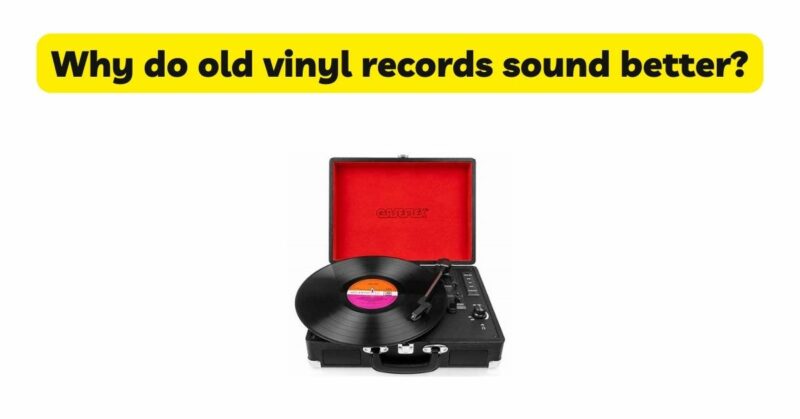The vinyl record resurgence in recent years has reignited the debate surrounding the sound quality of old vinyl records. Many enthusiasts passionately argue that there is a certain charm and appeal to the sound produced by vintage vinyl records that cannot be replicated by modern formats. This article aims to delve into the reasons behind the perception that old vinyl records sound better. By examining factors such as mastering techniques, analog warmth, vinyl quality, and the role of nostalgia, we can unravel the allure of old vinyl records’ sound quality.
- Analog Warmth and Dynamics
One of the primary reasons why old vinyl records are believed to sound better is the analog warmth they possess. During the analog era, the mastering process often involved less aggressive compression, allowing for a wider dynamic range and a more natural sound reproduction. This resulted in a richer listening experience with greater depth and subtlety in the music.The analog nature of vinyl records also introduces a unique characteristic known as “warmth.” The physical process of pressing sound into vinyl grooves, combined with the playback on a turntable, can create subtle harmonic distortions that some listeners find pleasing. These distortions add a certain warmth and texture to the music, making it sound more organic and engaging.
- Mastering Techniques and Artistic Intent
Old vinyl records were often mastered using techniques that emphasized the artistic intent of the music. The focus was on capturing the energy and emotion of the original recordings, with less emphasis on heavy-handed post-production manipulation. This resulted in a more faithful representation of the artist’s intended sound, providing a genuine and immersive listening experience.Moreover, the mastering engineers of the past had a deep understanding of the vinyl medium and its limitations. They knew how to optimize the sound for the format, considering factors such as groove spacing and potential playback issues. This attention to detail in the mastering process contributed to the perception that old vinyl records sound better.
- Vinyl Quality and Manufacturing Techniques
The quality of the vinyl used in old records is often considered superior to that used in some modern pressings. Original vinyl records were commonly made from high-quality virgin vinyl, which had fewer impurities and resulted in a cleaner sound. The manufacturing processes of the past also played a role, as the manual cutting of grooves and creation of stampers introduced subtle variations that added character to the sound.Additionally, the vinyl records produced in earlier years were typically thicker and heavier, allowing for deeper grooves and potentially better sound reproduction. These factors, combined with meticulous attention to detail during the manufacturing process, contributed to the overall sound quality and durability of old vinyl records.
- Nostalgia and Emotional Connection
Nostalgia and emotional connection play a significant role in the perception that old vinyl records sound better. The tangible nature of vinyl, combined with the ritual of handling and playing records, evokes a sense of nostalgia for a bygone era of music consumption. This emotional attachment can influence how listeners perceive the sound quality and enhances the overall enjoyment of the music.Furthermore, the act of seeking out and collecting old vinyl records can provide a sense of discovery and a connection to the past. The process of exploring record stores, discovering hidden gems, and uncovering rare or limited editions adds to the enjoyment and appreciation of the music.
- Subjective Listening Experience
Sound quality is inherently subjective, and what sounds better to one person may not be preferred by another. Each individual has unique preferences when it comes to sonic characteristics such as warmth, clarity, and overall tonal balance. Some listeners may appreciate the smooth and warm sound of old vinyl records, while others may prefer the precision and detail offered by digital formats or newer pressings.Additionally, the playback equipment and setup used can significantly impact the perceived sound quality of old vinyl records. High-quality turntables, cartridges, amplifiers, and speakers, combined with proper calibration and maintenance, can enhance the sound reproduction and provide a more enjoyable listening experience.
Conclusion
The perception that old vinyl records sound better is rooted in a combination of factors, including analog warmth, mastering techniques, vinyl quality, nostalgia, and personal preferences. The unique characteristics and sonic qualities of vintage vinyl records contribute to their enduring appeal among audiophiles and music enthusiasts.While modern formats and technologies have their own advantages, the allure of old vinyl records lies in their ability to transport listeners to a different time and offer a genuine and immersive musical experience. Whether it is the warm sound, the attention to artistic intent, or the emotional connection to the past, the fascination with old vinyl records’ sound quality continues to captivate music lovers around the world.

